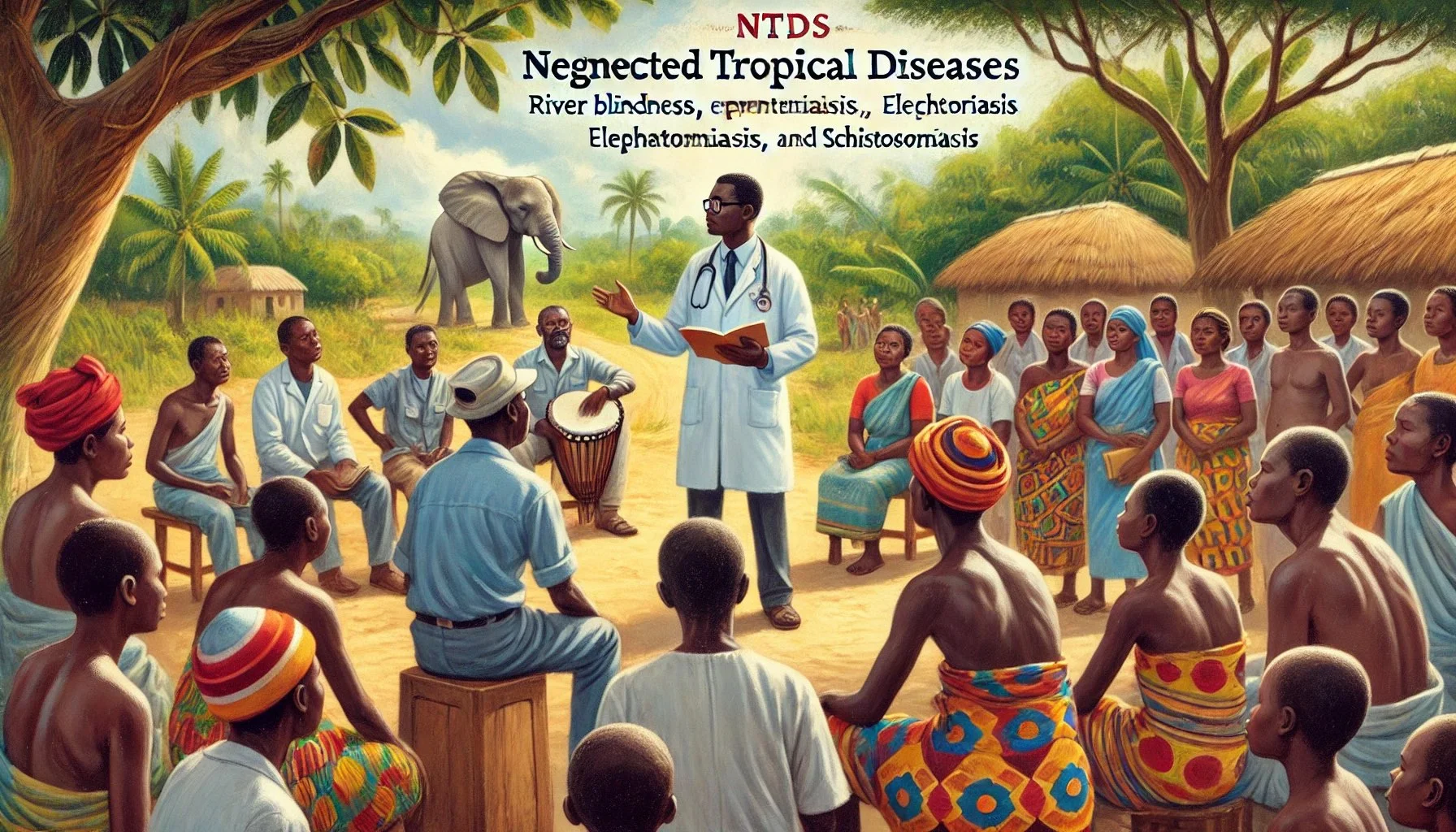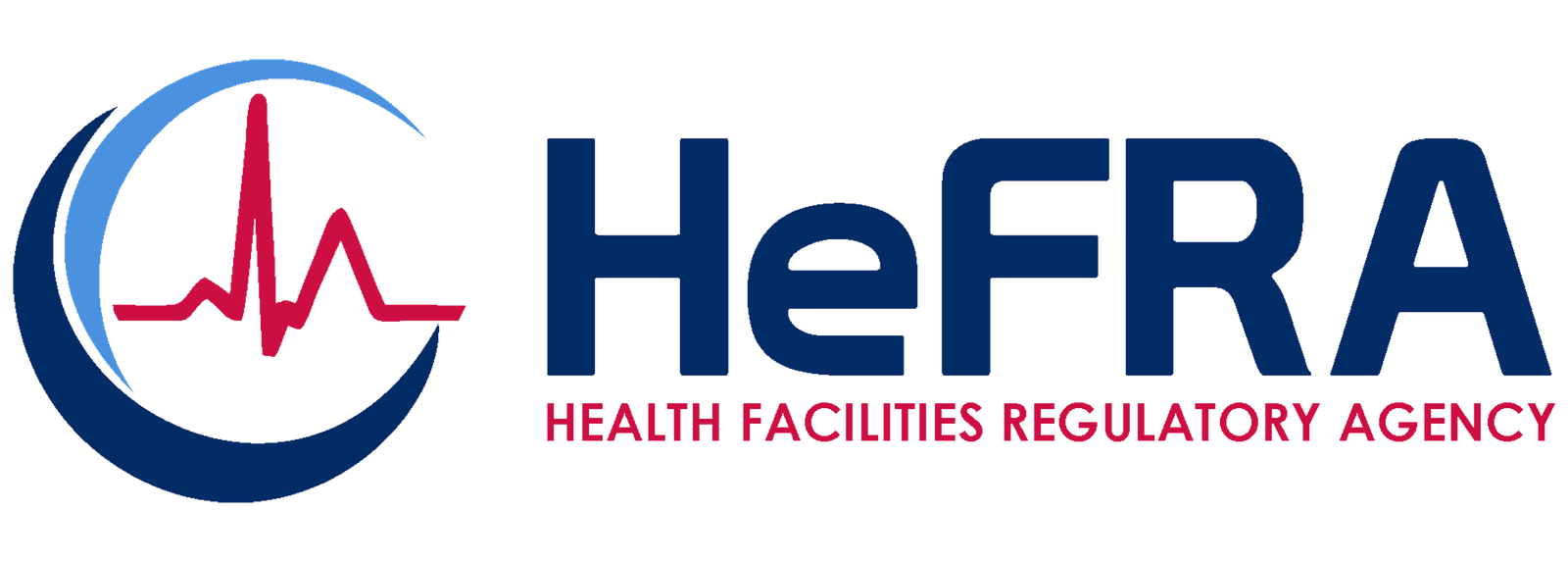
Battling the Unseen: The Truth About Neglected Tropical Diseases 🧟♂️
Part 1: Introduction
What Are Neglected Tropical Diseases (NTDs)?
Neglected Tropical Diseases (NTDs) are a group of infections that mostly affect people in tropical and subtropical regions, such as Ghana. These diseases are called “neglected” because they receive less attention and research funding compared to other illnesses like malaria or HIV/AIDS—even though they cause serious health problems in millions of people around the world.
Why Are They Called Neglected?
- Limited Awareness: Many people do not know much about these diseases, so they often go undiagnosed and untreated.
- Less Funding: Governments, organizations, and researchers sometimes focus on more well-known diseases, causing NTDs to get fewer resources.
- Affect Poorer Communities: These diseases often affect poor and remote communities with limited healthcare access, making it difficult for patients to seek timely treatment.
Despite being called “neglected,” it is important for Ghanaians to recognize, prevent, and treat these diseases to stay healthy.
Part 2: Common Neglected Tropical Diseases in Ghana
Below are some of the NTDs that can be found in Ghana. We will discuss causes, signs and symptoms, treatment, complications, and myths surrounding them.
1. African Trypanosomiasis (Sleeping Sickness)
- Cause: Caused by a parasite called Trypanosoma brucei, transmitted by the tsetse fly.
- Signs & Symptoms: Fever, headaches, joint pains, itching, and later confusion, poor coordination, and sleep disturbance.
- Treatment: Specific anti-parasitic medicines (e.g., pentamidine, suramin, melarsoprol). Early detection is critical to prevent complications.
- Complications: Without treatment, it can damage the brain and nervous system, leading to coma or death.
- Myths: Some believe that only “weak” people get sleeping sickness or that it can be cured by certain herbal mixtures. In reality, anyone bitten by an infected fly can get it, and proper medical treatment is needed.
2. Marburg Virus Disease
- Cause: A virus similar to Ebola, spread by contact with infected animals (often bats) or humans.
- Signs & Symptoms: Sudden fever, severe headache, muscle pain, vomiting, diarrhea, and bleeding.
- Treatment: Supportive care in a hospital—fluids, treating infections, and keeping oxygen levels stable. There is no widely available specific cure, but medical care greatly improves survival.
- Complications: Severe bleeding, organ failure, and death if untreated.
- Myths: Some believe marburg virus disease is a curse or punishment. It is a viral infection and can affect anyone. Early treatment in a hospital can save lives.
3. Rickettsial Diseases
- Cause: Bacteria transmitted by ticks, fleas, and lice.
- Signs & Symptoms: Fever, rash, headache, and body pains.
- Treatment: Antibiotics (such as doxycycline).
- Complications: If untreated, can lead to damage to organs like the heart, lungs, and brain.
- Myths: Some might attribute rashes and fever to “bad spirits.” Seek medical testing to identify the real cause.
4. Rabies
- Cause: Virus transmitted by bites or scratches from infected animals (often dogs).
- Signs & Symptoms: Fever, headache, confusion, difficulty swallowing, and fear of water (hydrophobia).
- Treatment: Once symptoms appear, rabies is almost always fatal. However, if you are bitten by an animal that could have rabies, you should immediately start post-exposure shots (vaccines) to prevent the disease.
- Complications: If not prevented in time, rabies can lead to death.
- Myths: Some people think you can burn or cut the wound to prevent rabies. This is unsafe and not effective. Only vaccination and medical care can protect you.
5. Leptospirosis
- Cause: Bacteria (Leptospira) found in water or soil contaminated with the urine of infected animals (rats, livestock, etc.).
- Signs & Symptoms: High fever, headache, chills, muscle aches, vomiting, and sometimes jaundice (yellow skin/eyes).
- Treatment: Antibiotics (doxycycline, penicillin) if diagnosed early.
- Complications: Can affect kidneys, liver, and cause meningitis if untreated.
- Myths: Some believe drinking certain herbs can “flush out” the bacteria. Proper antibiotics and medical care are essential for cure.
6. Leishmaniasis
- Cause: Parasite transmitted by sandfly bites.
- Signs & Symptoms: Skin sores, fever, weight loss, swelling of the spleen and liver in some forms.
- Treatment: Specific anti-parasitic medicines (e.g., pentavalent antimonials, miltefosine).
- Complications: Kidney damage, anemia, and can be fatal if not treated.
- Myths: Traditional ointments may relieve discomfort but do not kill the parasite. Seek medical attention.
7. Chikungunya
- Cause: Virus spread by infected mosquitoes (Aedes species).
- Signs & Symptoms: High fever, joint pains, rash, headache.
- Treatment: No specific cure, but pain relievers, rest, and fluids help.
- Complications: Usually not life-threatening but can cause long-term joint pain.
- Myths: Some claim papaya leaves or other herbal teas can cure chikungunya. While supportive herbs might help you feel better, they do not eliminate the virus.
8. Zika Virus
- Cause: Virus also spread by Aedes mosquitoes.
- Signs & Symptoms: Mild fever, rash, joint pain, conjunctivitis (red eyes). Some people have no symptoms.
- Treatment: Rest, fluids, and pain relievers. No vaccine widely available yet.
- Complications: Can cause birth defects (microcephaly) if a pregnant woman is infected.
- Myths: Zika is not caused by witchcraft. It is a mosquito-borne virus. Prevention through mosquito control is key.
9. Dengue Fever
- Cause: Virus spread by Aedes mosquitoes.
- Signs & Symptoms: High fever, headache, pain behind the eyes, severe joint and muscle pain, rash.
- Treatment: No specific drug for dengue; supportive care (fluids, rest, pain relievers like paracetamol).
- Complications: Severe dengue can lead to bleeding, shock, and can be fatal without prompt care.
- Myths: Some believe a single mosquito bite can never cause serious disease. In reality, one infected bite can transmit dengue.
10. Leprosy (Hansen’s Disease)
- Cause: Slow-growing bacteria called Mycobacterium leprae.
- Signs & Symptoms: Skin lesions that may lose sensation, numbness, and weakness in hands or feet.
- Treatment: Multi-drug therapy (combination of antibiotics) for several months.
- Complications: Permanent nerve damage, disfigurement if untreated.
- Myths: Leprosy is often thought to be highly contagious, but it is not. It spreads slowly and requires close contact over a long period. It is curable with modern medicine.
11. Trachoma
- Cause: Bacterial infection (Chlamydia trachomatis) spread by direct contact with eye discharge, flies, or contaminated items.
- Signs & Symptoms: Redness, irritation, discharge in the eyes, and can lead to eyelid scarring.
- Treatment: Antibiotics (azithromycin), improved hygiene, surgery for advanced cases.
- Complications: Blindness if not treated.
- Myths: Some believe it is caused by curses. In reality, it is a bacterial infection made worse by poor sanitation.
12. Helminthiasis (Worm Infections)
- Cause: Various parasitic worms (roundworms, hookworms, tapeworms), often from contaminated food or water, or walking barefoot on contaminated soil.
- Signs & Symptoms: Stomach pains, diarrhea, weakness, weight loss.
- Treatment: Deworming medicines (albendazole, mebendazole, praziquantel).
- Complications: Severe anemia, malnutrition, organ damage if left untreated.
- Myths: Some believe skipping meals kills worms. Only proper deworming and good hygiene can effectively eliminate worms.
13. Schistosomiasis (Bilharzia)
- Cause: Parasitic worms (schistosomes) found in freshwater snails. People get infected when swimming or wading in contaminated water.
- Signs & Symptoms: Blood in urine or stool, stomach pain, diarrhea, rash or itchy skin after contact with contaminated water.
- Treatment: Praziquantel is the main treatment.
- Complications: Organ damage to liver, kidneys, bladder, and can cause developmental problems in children.
- Myths: Some attribute blood in urine (especially in teenage boys) to natural development. It could be bilharzia. Get tested and treated early.
14. Chagas Disease
- Cause: Caused by the parasite Trypanosoma cruzi, often spread by a type of insect called the “kissing bug.” It is more common in parts of Latin America but can occasionally occur in travelers or rare local transmissions.
- Signs & Symptoms: Swelling around the eye or bite wound, fever, fatigue. Chronic infection can damage the heart and digestive system.
- Treatment: Specific anti-parasitic drugs (benznidazole, nifurtimox).
- Complications: Heart failure, digestive complications if untreated for years.
- Myths: Many do not think of Chagas as a possibility in Ghana, but global travel and migration can make it appear. Proper testing and treatment are essential.
Part 3: Prevention Tips
- Keep Your Environment Clean: Dispose of rubbish properly to reduce breeding grounds for flies, mosquitoes, and rats.
- Use Protective Measures: Sleep under mosquito nets, apply insect repellent, wear protective clothing in areas with ticks or tsetse flies.
- Safe Water and Food: Drink treated water, wash fruits and vegetables thoroughly.
- Vaccinate (Where Possible): Keep up to date on recommended vaccines (e.g., rabies shots for pets).
- Early Treatment: If you notice any unusual symptoms, seek medical help immediately. Early diagnosis is key to successful treatment.
Part 4: Myths and Facts
- Myth: Herbal remedies alone cure all neglected tropical diseases. Fact: While some herbs might help with symptoms, these diseases are caused by specific viruses, bacteria, or parasites. You need proper medical treatment to fully treat or manage them. Myth: NTDs only affect the poorest or “dirty” communities.
- Fact: While they are more common in poor areas, anyone who comes into contact with the source of infection can be affected.
- Myth: Traditional healers’ claims are always reliable. Fact: Some traditional remedies may offer relief, but many claims have no scientific proof. Always seek diagnosis and advice from trained healthcare providers.
- Myth: If you feel better after a few days, you are cured. Fact: Stopping treatment early can lead to complications or drug resistance. Always complete the full course of medication.
Part 5: What To Do If You Suspect an NTD
- Go to a Health Facility: Visit a clinic, health center, or hospital for diagnosis and proper treatment.
- Do Not Self-Medicate: Avoid buying random drugs or relying solely on herbal mixtures without professional guidance.
- Follow Medical Advice: Complete all prescribed medications. Attend follow-up visits if recommended.
- Educate Others: Spread awareness in your community about the importance of hygiene, vaccination (if available), and early treatment.
Part 6: Conclusion
Neglected Tropical Diseases are called “neglected” because they receive less attention, but they can be very serious if untreated. In Ghana, diseases like trypanosomiasis, Marburg, rabies, leptospirosis, and others remain a threat, especially in rural communities. By understanding their causes, recognizing the symptoms, and seeking prompt treatment, you can protect yourself and your loved ones.
Remember, avoid myths and unproven cures. Your best line of defense is accurate information, good hygiene, environmental cleanliness, and proper medical care. If you or anyone around you shows signs of these diseases, do not delay—seek medical help from a qualified health professional.
Stay informed, stay safe, and help spread the word about these important but often overlooked illnesses.
- 🐍🌳 Snake Bites: MUST KNOW For All Ghanaians
- Hepatitis A|B|C|D|E In Ghana: A Practical Guide For Everyone 💉⚠️🦠
- Rickettsial Diseases, Rabies, Leptospirosis, Leishmaniasis, Chikungunya, Zika, And Dengue Fever 🌡️😷
- 🇬🇭 Typhoid in Ghana: Are You at Risk? Spot the Signs Early 🦠🌡️
- The Ultimate Guide on Common Infections in Ghana📖: What You Need to Know and How to Stay Healthy 🤒🦠🏥

We Love to Educate for Free
But please do not self-medicate as wrong doses of even correct medications can cause serious complications like kidney failure and even death. You can talk to a LICENSED health professional (including medical doctors, specialists, physician assistants, clinical psychologists, nutritionists/dieticians, medical herbalists, etc) by downloading the Deluxe Hospital app here:










